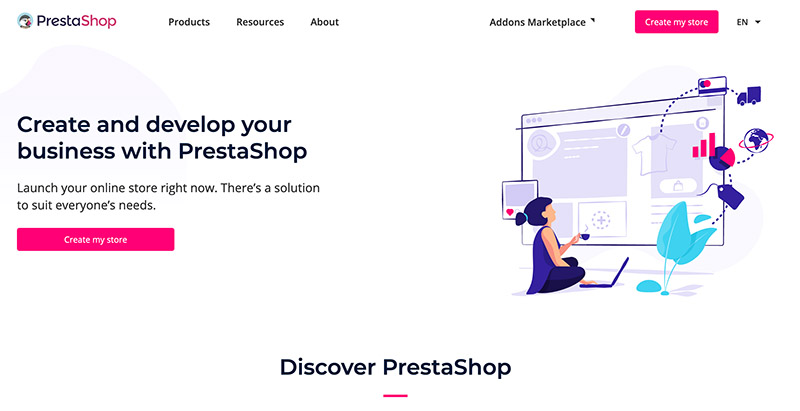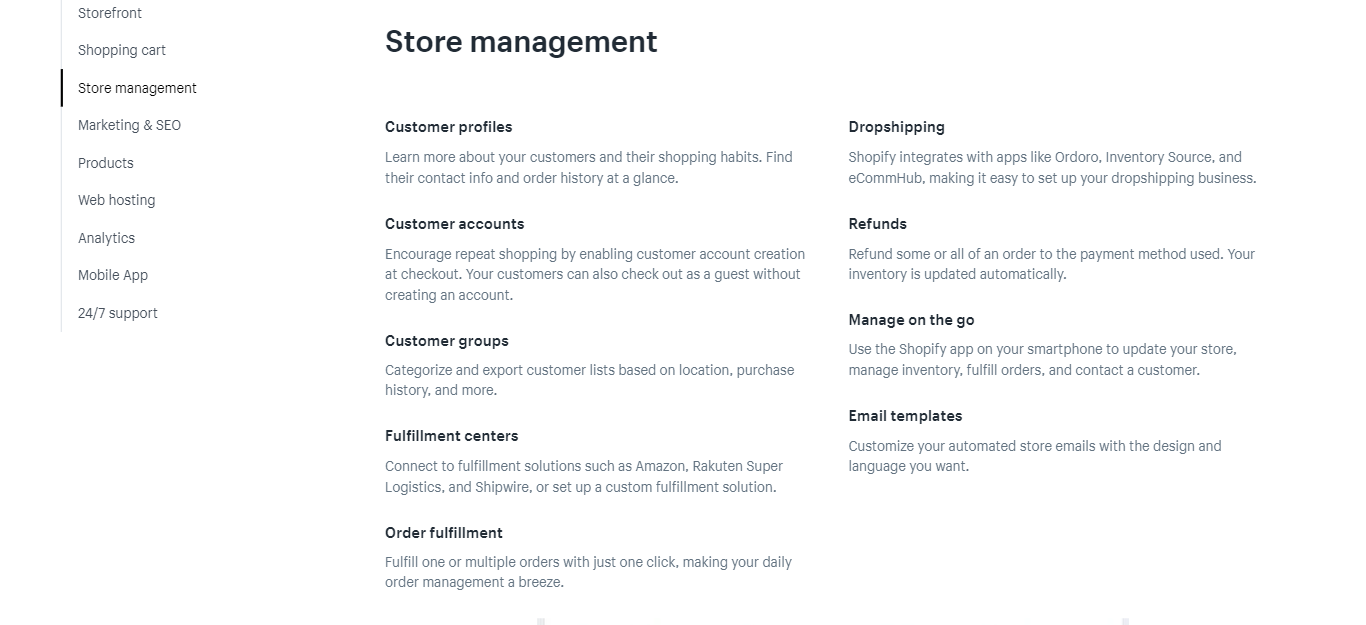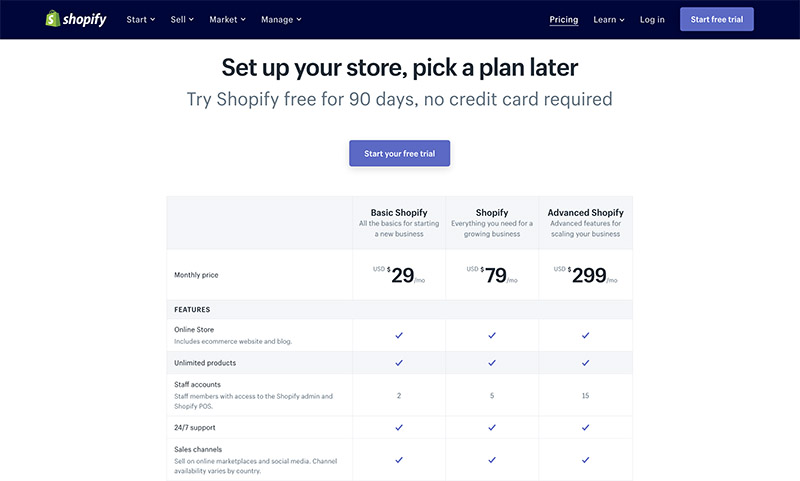Are you toying with the idea of selling your first products online? Or are you considering migrating your digital shop to a better eCommerce platform? If either scenario rings true, you're in the right place. As in this article, we'll compare PrestaShop vs Shopify to help you establish which online store builder's best for your ecommerce business.
So, without further ado, let’s take a look at these two platforms!
Who's PrestaShop and Shopify?
In short, PrestaShop is an open source ecommerce platform that enables you to build anything from a small online shop to a full-on shopping cart solution. With a massive add-on market and a great set of in-built features, PrestaShop presents a scalable solution for e-commerce merchants.
Shopify, on the other hand, is a comprehensive SaaS. It's the market's leading online store builder – and for a good reason. It provides users with one of the most extensive eCommerce toolkits of all its competitors. Its drag-and-drop store builder is nothing short of intuitive, and you can upload an unlimited number of products.
Not to mention, Shopify also seamlessly integrates with a vast number of third-party plugins, payment gateways, and marketplaces. So, rest assured, you'll be able to utilize omnichannel selling to the fullest whether you're a small business or an established enterprise.
PrestaShop vs Shopify: Their Pros and Cons
Let's start with PrestaShop…
PrestaShop Pros 👍
- PrestaShop is free to download and install, and once you're all set up, you could face minimal recurring costs
- PrestaShop's open-source nature allows you to expand and customize your store as you need.
- When you download the basic version of PrestaShop, you'll enjoy an extensive set of features. For example, inventory tracking, product management, an online shopping cart, analytics, reporting, etc.
- You get access to a range of store management options, including tools for handling orders, and customers can create accounts (if you want).
- There are thousands of modules you can access from PrestaShop's add-on market.
- You have complete control over the security measures you take to protect your online store.
PrestaShop's Cons 👎
- As anyone can create and sell PrestaShop modules, your own web development might conflict with theirs. So, technical issues are more likely to arise.
- You're responsible for handling any problems yourself with the aid of the community.
- Additional themes or modules come at a premium price. It could cost several hundreds of dollars to get the functionality you want!
- If you want more than a basic store, there's a significant learning curve. So much so, that you may need to hire a developer if you don't have the right technical know-how.
- You need to find your own hosting, web domain, and ensure your own security.
👉 Check out ourfull PrestaShop review.
Shopify's Pros 👍
- Shopify offers excellent website security out-of-the-box.
- There's a comprehensive collection of add-ons and themes, which makes customizing and extending the functionality of your store easy.
- Shopify’s store builder is incredibly user-friendly.
- Even with its cheaper tiers, Shopify offers excellent store and inventory management features. It's amongst the best on the market where eCommerce tools are concerned.
- Shopify boasts a wide range of payment gateways to choose from.
- Shopify integrates with all the major social media platforms and marketplaces seamlessly.
Shopify's Cons 👎
- If you don't need all of Shopify's features, it could present an expensive recurring cost.
- The staff accounts you can create and store locations you can connect with is limited. Even on the advanced program, you're restricted to only 15 staff accounts.
- With only a handful of free themes available, Shopify's customization options aren't as extensive as PrestaShop's.
- Shopify's inbuilt blogging platform is quite basic.
👉 Check out our full Shopify reviews.
PrestaShop vs Shopify – Main Features
Both Shopify and PrestaShop boast an impressive set of eCommerce features that make it easy to display, sell, and manage your products. With that being said, let’s see how their main features compare…
Managing your Products
As we've already hinted at, both PrestaShop and Shopify enable you to create and update products quickly, categorize them on your store, and list them for your customers to peruse. You can configure their prices, publish their details, and set order requirements and shipping info.
You can also sell customizable goods where shoppers can upload files to help give you a better idea of what they're after!

Store Management
Shopify furnishes you with everything you need to run and manage a successful online store. However, to access their more advanced features, you'll have to shell out for their more expensive pricing tiers.

Both Shopify and PrestaShop allow you to do the following:
- List and sell unlimited products.
- Customers can create accounts.
- You can offer refunds.
- Handle order fulfillment
- Track your inventory
However, when it comes to store management features, there are noticeable differences between the two platforms…
- All Shopify stores come with a free SSL certificate (on all payment plans), which isn't something PrestaShop offers. However, they give users the option of adding one, but you'll need to purchase it independently.
- Shopify gives you access to over 100 payment gateways. Whereas, with PrestaShop, some of these same options can only be integrated through a paid-for module.
- PrestaShop permits you to run multiple stores from the same back office. Whereas Shopify only allows you to run one e-store from your dashboard. But you can link your account with between four and eight physical retail locations (depending on your chosen payment plan).
- PrestaShop enables you to create as many staff accounts as you like for free. Whereas, Shopify limits these to 15 (even on its advanced plan).

Marketing and SEO
Discounts, coupon codes, special offers, and free shipping are all marketing tactics you can create and manage using either platform. On top of all that, you can also connect your store with your social media platforms. Needless to say, this works wonders for promoting your products, driving traffic, and boosting brand awareness.
With Shopify, customers can also leave product reviews on your website. Plus, they make it easy to optimize your site for SEO – so over time, you're more likely to appear higher in Google's search results.
Similarly, PrestaShop also allows you to rewrite your URL and provides dedicated sections for SEO optimizing your web pages. They also offer a variety of paid-for SEO modules that will fill in your meta tags automatically. You can also download both free and premium modules that enable customers to leave product reviews on your site.
Customize your Storefront
Shopify has over 70 professional-looking themes to choose from. They're created by world-renowned designers and are all mobile-responsive. These make it easy to create a sophisticated-looking store. But, you're not limited to your theme's design, you can quickly customize nearly every facet of your website. Plus, with access to HTML and CSS, there are no limits on your creativity (providing you boast some coding know-how).
However, there are only eight free templates. All of Shopify's other themes are ‘premium' and come with a price tag ranging between $140 and $180.
With PrestaShop, you also have full control over the look of your online store. Via PrestaShop's add-on shop, you'll find thousands of themes and templates you can use (both free and paid-for).
PrestaShop boasts a selection of templates specially designed for different industries. To find a theme that meets your business needs, you can filter results based on template style and/or business sector. For instance, pets and animals, electronics, food and restaurants, fashion and shoes, health and beauty, just to name a few!
Multi-Language Options
Shopify supports over 50 languages, and you can translate your own (should you need to), whereas PrestaShop supports over 75 languages. Impressive, right?
Analytics and Reports
Shopify comes with an easy-to-read dashboard that highlights key sales, orders, and traffic information. So, you can monitor the performance of your business with just a glance.
You can also generate traffic and referral reports to see where visitors come from and how they found your store. That's in addition to product reports; these provide an insight into your store’s growth, best selling products, which items aren't as popular, etc. You can then export these reports and send them to your bookkeeper. On top of all that, Shopify also integrates with Google Analytics.
Similarly, with PrestaShop, you also get access to analytics and reports about sales, customers, products, and marketing.
PrestaShop vs Shopify: Ease of Use
Shopify takes you through the entire process of creating an online store from start to finish. It's incredibly accessible to new users. Choosing and customizing Shopify themes is very intuitive, and listing products is a breeze.
PrestaShop, on the other hand, is primarily an open-source e-commerce platform. So, if you only want to launch a basic online business, you don't need much technical knowledge. However, if you're going to create a more sophisticated online store, you'll need some coding know-how. Or, you'll have to hire a developer to bring your vision to life. Alternatively, you might have to spend more on modules to extend the functionality of your store.
In short, getting an e-store up and running with PrestaShop is way more complicated than Shopify.
PrestaShop vs Shopify: Pricing
Now we've covered what each has to offer, let's see how much PrestaShop and Shopify will set you back…
Shopify

Shopify charges a monthly subscription. There are four pricing tiers, targetting business owners at different stages of their entrepreneurial journey, i.e., those starting a new business, growing a business, or scaling a more established site.
At this point, we want to highlight that Shopify offers a 14-day free trial with each of these plans.
The Shopify Lite Plan
For $9 a month, you can start selling online via Facebook or any website or blog where you can list products and accept credit card payments.
Read our Shopify Lite review.
The Basic Shopify Plan
For $29 a month, the Basic Shopify plan provides all the core features you need to get started – including:
- Unlimited products
- Your own online store with a blog
- Two staff accounts
- Omnichannel selling
- You can link your e-store with up to four physical store locations.
The Shopify Plan
At $79 a month, the Shopify plan grants the freedom you need to grow your business. In addition to all the above features, you'll also gain access to five staff accounts, be able to generate professional reports, and integrate with five retail store locations.
The Advanced Shopify Plan
This sees a jump in pricing to $299 a month. But, you can create 15 staff accounts, integrate up to eight store locations, access Shopify's advanced report builder, and benefit from third-party calculated shipping rates.
👉 Check out our Shopify pricing guide.
Other Things to Note
If you're a massive operation, you might benefit from the Shopify Plus plan. This package sees to all your advanced enterprise needs and is available at a custom price. If you're interested, contact them directly for more info.
You'll also want to keep an eye on Shopify's transaction fees. You'll incur these with all payment providers other than Shopify Payments. These range from as little as 0.5% on the Advanced Shopify plan to as much 2.0% with the Basic Shopify package. There are also credit card processing fees – online credit card rates start at 2.9% + 30 cents.
PrestaShop
As we've already said, PrestaShop is an open-source e-commerce solution. So, it's free to download. There aren't any monthly fees to pay or a percentage of your sales taken away – as such, if you're happy to put in the extra legwork, you can start selling for very little.
But, to expand the functionality of your store, you may want to purchase add-ons and premium themes from PrestaShop's marketplace. Premium themes can easily set you back $100, and many of the more useful plugins start from around $50. But, Amazon and eBay integrations cost a whopping $299 and $289!
You're also responsible for purchasing your own web hosting. So, this is another cost you'll have to bear in mind and factor into your budget. Whilst hosting from some providers is as little as $2.59 a month (DreamHost), more advanced hosting for larger stores will set you back further. You may also want to invest in an SSL certificate, which usually costs around $90 a year.
PrestaShop vs Shopify: Customer Support
PrestaShop provides customer support through live chat, email, and telephone. There's also a vast user community you can connect with via PrestaShop's forum. Here you can look for the answers to questions and discuss any problems that arise with other PrestaShop users and developers.
Shopify offers 24/7 customer support via email, live chat, and over the phone. They pride themselves on providing some of the best customer support in the industry. There are also loads of community support online.
Shopify vs PrestaShop: Which eCommerce Software is Right for Your Business?
Looking at PrestaShop and Shopify side by side, we're happy to report that both provide a fantastic set of features for managing your online store, inventory, and selling online. Also, both offer a scalable eCommerce experience, which is a bonus!
What it boils down to is usability and technical knowledge, as well as your budget requirements.
Shopify, as a hosted service, makes things easier for you. Hosting and security are included, and you can work with a tried-and-tested drag-and-drop editor to customize your store. Technical issues aren't as frequent, and when they do arise, you can rely on Shopify's customer support team to fix them. Of course, this all-inclusive service comes at a price. So, you might be limited by your budget.
PrestaShop, on the other hand, could, in the long-term, be hugely cost-efficient. Once you've shelled out for all your initial purchases and have the functionality you need, you'll only have to pay for hosting, your domain name, and SSL certificate. But, PrestaShop comes with a much steeper learning curve, lending itself best to web developers.
However, if you have the right know-how, PrestaShop provides limitless options regarding integrations, customization, and functionality.
Do you have experience running an eCommerce website using either of these platforms? Tell us in the comments below. PrestaShop vs Shopify – let us know which one you'd choose. Or, do you use an alternative like Magento, WordPress + WooCommerce, OpenCart, or BigCommerce? Which do you think is the best e-commerce platform? Either way, tell us about it. We look forward to hearing from you soon!







Thank you for the useful information. I’ve been deciding between Presta and Shopify for a long time now. Needed to find a rather user-friendly solution with lots of features that would help in store management. I’m not a techie, that’s why I will probably go with Shopify. Besides, I’ve tried moving my Magento store’s data to it with Cart2Cart’s migration preview option. It helped me test the platform in action without the need of installing Shopify itself.
👍👍👍